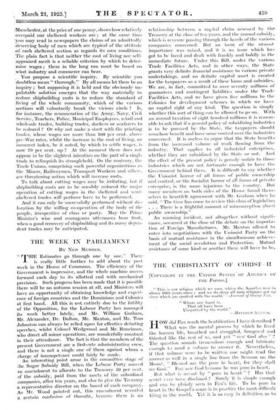THE WEEK IN PARLIAMENT
By NEW MEMBER. THE Estimates go through one by one." There is really little further to add about the past week in the House of Commons. The efficiency of the Government is impressive, and the whole machine moves forward each :day to its allotted end with mechanical precision. Such progress has been made that it is possible there will be no autumn session at all, and Ministers will have an opportunity. of obtaining knowledge and experi- ence of foreign countries and the Dominions and Colonies at first hand.. All this is not entirely due to the futility of the Opposition, for the Labour Party has managed its work better lately, and Mr.. William Graham, Mr. Alexander, Dr. Dalton, Mr. Maxton, and Mr. Tom Johnston can always be relied upon for effective debating speeches, whilst Colonel .Wedgwood and Mr. Runciman, who direct all minor operations, are wonderfully constant in their attendance. The fact is. that. the members of the present Government are a first-rate administrative crew, and there is not a single one of them against whom a charge of incompetence could fairly be made. An interesting point arose in the committee . stage of the Sugar Subsidy Bill, when the Labour Party moved an amendment to allocate to the Treasury 50 per cent. of the subsidy, paid from the assets of the subsidized companies, after ten years, and also to give the Treasury a .representative director on. the board of each company. As Mr. Wood pointed out, this amendment revealed a .certain confusion of thotteht, because there is no relationship between a capital claim assessed by the Treasury at the close of ten years, and the annual subsidy, which is revenue passing through the hands of the various companies concerned. But an issue of the utmost importance was raised, and it is an issue which has got to be faced and dealt with frankly and boldly in the immediate future. Under this Bill, under the various Trade Facilities Acts, and in other ways, the State grants very definite financial assistance to various private undertakings, and no definite capital asset is created for the taxpayers as a result of these loans and subsidies. We are, in fact, committed to over seventy millions of guarantees and contingent liabilities under the Trade Facilities Acts, and we have given five millions to the Colonies for development schemes in which we have no capital right of any kind. The question is simply whether this sort of thing can be allowed to go on. With an annual taxation of eight hundred millions it is reason- able to ask that if a general policy of subsidizing industries is to be pursued by the State, the taxpayers should somehow benefit and have sonic control over the industries concerned. It is useless to argue that the State benefits from the increased volume of work flowing from the industry. That applies to all industrial enterprises, whether they are subsidized by the State or not. And the effect of the present policy is grossly unfair to those industries which are not fortunate enough to have the Government behind them. It is difficult to say whether the Unionist horror of all forms of public ownership and control, or the Socialist horror of all forms of private enterprise, is the more injurious to the country. But many members on both sides of the House found them- selves in heartfelt agreement with Mr. Graham when he said, " The time has come to review this class of legislation . . . There is a frightful amount of misconception about public ownership."
An amusing incident, not altogether without signifi- cance, occurred at the close of the debate on the importa- tion of Foreign Manufactures. Mr. Maxton offered to enter into negotiations with the Unionist Party on the basis of mutual assistance in the simultaneous achieve- ment of the social revolution and Protection. Mutual assistance of some kind or another there will have to be.






















































 Previous page
Previous page